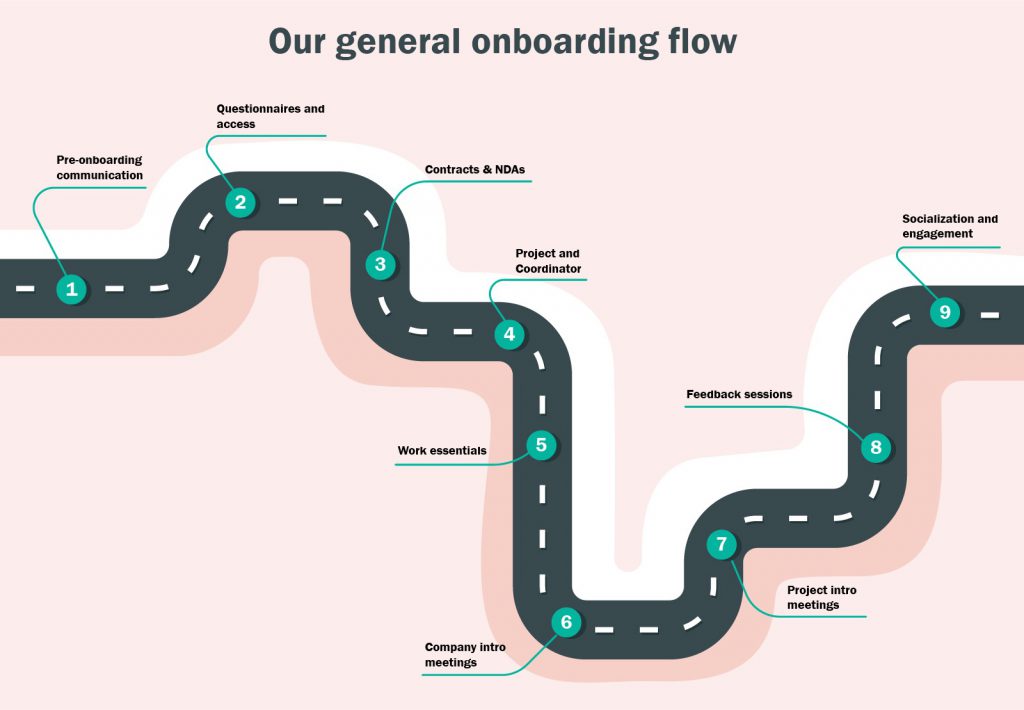
Onboarding that makes a difference
Onboarding is an expensive, stressful, and time-consuming process that can either make or break a person’s journey in a company. Here are some stats that confirm its extreme importance:
- Employees who enjoyed their onboarding were 18 times more likely to feel highly committed to their company.
- After a great onboarding experience, 89% of new hires were strongly integrated into their company culture.
- Companies with a strong onboarding process improved new hire retention by more than 80% and productivity by over 70%.
- 69 percent of employees are more likely to stay with a company for three years if they experience great onboarding.
At the same time,
- 28% of employees quit in their first 90 days when experiencing poor onboarding.
- Replacing each failed executive can cost a business up to 213% of their salary.
- Without proper onboarding experience, about 25% of all new employees will leave a company within a year.
The statistics prove that a well-tuned onboarding experience is vital both for a newcomer and a company. It influences a company’s image, retention, employee involvement, effectiveness, and proactiveness and can save a lot of money. These are the main reasons why we pay so much attention to it.
What we do differently during onboarding
The trial period at Railsware usually takes about 3 months, while the onboarding process only 2-3 weeks. During this short period, we help a newcomer to become a full member of our team. We believe that the key factors for successful onboarding are clear and broken down tasks, honest feedback, and mentoring. To ensure these aspects, we combined some best practices and our own discoveries:
HR as a single reliable touchpoint for a newcomer
The first responsibility of HR is to present information and introduce our team culture to new members. It’s critical that HR nails the first impression because a newcomer’s engagement with the team culture is pivotal to long-term performance and retention. From day 1, newcomers have their personal channel in Slack where they can communicate with an HR manager, ask any questions, and get personal/private information. This also requires extensive training of the HR team who become knowledgeable in lots of business areas – from various tools we use to financial processes and internal communications.
Recruiter/HR is often the first person a candidate meets when joining a new team. That’s why it is so important for an HR to be the one newcomers can trust. Building trustworthy relationships during the hiring process is our top priority from day one (or even earlier). We help newcomers with their very first steps, no matter if it’s finances, legal, transportation, relocation, benefits or a whole bunch of other organizational moments. For me as an HR the best accomplishment is seeing the person you’ve found thrive and feel great in Railsware

Valeria Hromtseva
Talent Manager at Railsware
A coordinator as a bridge between a newcomer and a team
The primary coordinator’s responsibility is to illustrate the link between a new team member’s job and the organization’s larger mission. Also, coordinators introduce components of the job and expected performance levels as well as critical skills to shorten newcomers’ time to productivity. And lastly, coordinators can use coaching conversations to correlate their responsibilities and expectations, provide on-the-job insights, and build engagement.
Portioning information
We tried to give newcomers comprehensive information about everything on the first day back in our history. Even the shortened presentation took about 5-6 hours. Obviously, the practice was exhausting for HR managers and inefficient for newcomers. This is why we divided all the info into six topics, prioritized them, and now provide it in an order of necessity. We doze the information the first two weeks so that a person can spend at least 50 percent of their time on accrual work and all the rest on onboarding.

Valeria Hromtseva
Talent Manager at Railsware
Dividing info into portions is key for both newcomers and HR comfort. Our job is not to do the intro session for the sake of a checkmark. We care about new team members and want them to become independent ASAP, so that they can do their actual work. We explain every detail and adapt each time when we get newcomers’ feedback
Allowing self-learning
We understand that people may forget things (especially during onboarding when everything is new) and might not want to ask the same questions repeatedly. So we have collected all the necessary information in a single repository so that new specialists can refresh their knowledge about some processes when they need it. As well as that, every newcomer gets a personalized ticket in Jira with a Smart Checklist that helps them track their onboarding progress and not to miss a thing.
Being a remote-friendly team, with teammates in around 15 countries, we know how important it is to have all necessary information not only introduced to a newcomer during Intro Meetings but also shared for self-learning. It is especially hard for a newcomer to remember a huge load of new information about the team in their first days and weeks. To help them along this way, we split the information by a few Intro meetings and have a checklist of what they need to read/watch on their own. The data is structured by days, weeks or months of work. This way it is given gradually and does not overload a new person.

Olia Ududiak
People Operations Manager
We also created a Handbook with the most essential information about our team.

Olia Ududiak
Talent Manager at Railsware
We do expect newcomers to forget things. As it is completely natural for a human brain, especially with new information. That is why we love documenting stuff so much, as it helps people make the most of their memory. We designed an Internal Handbook to help newcomers find answers to their questions or just learn more about us when there is no one around. By checking it out, newcomers can find the team’s history and values, a detailed overview of policies, procedures, key approaches, guides, and everything else they might want to know. This way we care about our newcomers, no matter what time of the day or part of the world it is. Still, Newbies can ask their trusted HRs any questions. Just to have a nice chat once in a while.
Becoming a newcomer’s advocate
To be competitive in the market and attract the best candidates, HR managers, coordinators, and line managers at Railsware should protect a newcomer’s interests just as much as the company’s. We find out the candidate’s goals and needs to understand if they can be met within the team. We offer honest collaboration and guarantee fair and unbiased decisions after the onboarding and trial periods.
Establishing two-way communication
To ensure the final decision after the trial period is as impartial as possible, we constantly track a person’s progress via feedback sessions. As mentioned before, we have at least three of them. Before a feedback session, Railswarians who worked closely with a newcomer must prepare detailed feedback for the person and about the company that would include positive aspects and aspects to be improved based on some real situations. A newcomer prepares the same feedback about our team, processes, and him/herself as well. After each feedback session, we can adjust a person’s trial plan or some details mentioned during the session.
Socializing
It’s not always easy to establish regular casual communication between people from different departments, especially in a remote team. However, we need to help a person dive into the working process and the team’s life. We use the Donut app that imitates random coffee breaks, set up introductory meetings, meet in person in different cities, have regular dinners, and much more.
Since we are distributed around the globe we have many online events and are always looking for some new activities and interactions. Firstly, we enjoy meeting colleagues from different locations and have some fun together outside of work. It’s a great opportunity to discover some cultural specifics, differences in mentality, or just find a person with similar hobbies. Secondly, we strive to create a trustful atmosphere and a feeling of one big family. The Donut app is one of many tools we use to help Railswarians to meet people they haven’t met before. The process is very smooth. A bot randomly matches you with a colleague, shows available time slots, and helps to schedule a meeting. It’s just about a few minutes of coffee break with pleasant topics and a good possibility to make new friends from different teams, projects or locations.

Daryna Kuzmyk
Recruitment Expert at Railsware
Learning after each iteration
We want to believe our onboarding process is perfect. Nevertheless, the conditions change all the time, the same as candidates’ expectations. We prefer to ask each newcomer about their onboarding experience personally when the trial period ends. HR managers run a customer development (custdev) meeting to find out what was great and what needs improvement. This valuable knowledge paves the way to an even better and smoother onboarding process at Railsware.
During customer development sessions, the majority of new hires claimed our onboarding process was great and added to the company’s image. Overall satisfaction and great experience within the company lead to recommendations becoming one of the most popular ways of hiring for us.

How we built the onboarding process at Railsware
I guess it would be much better to say “how we are building” this process, as we are constantly reviewing it in order to improve and adjust it to modern reality. Anyway, let’s take a look at the current onboarding flow.

The flow looks pretty common for teams like ours, but it aims at letting a person get acclimated and blend in fast. At the same time, we strive to streamline and automate many formal processes. For instance, we use questionnaires and Google forms a person needs to fill in to regulate some aspects and collect the necessary data more conveniently.
During a project allocation, newcomers meet their future manager or coordinator. We believe that coordinators have a great influence on the onboarding process, perhaps even bigger than a HR manager. It’s important that project coordinators understand their impact, get trained, and do their best when working with newcomers.
No matter what place a person chooses to work from, we make sure they get all the essentials required to do the job well. It’s also a nice tradition to visit one of our offices at the beginning of the person’s journey, to meet other team members in person and build connections.
During the company intro meetings, an HR introduces a person to who our team is, our culture, and our values, along with all of the must processes, like finance, security, Railsware approaches to doing things (MoSCoW prioritization, RASCI roles allocations, documenting, Slack communication rules, time tracking), and many other crucial aspects necessary from day 1.
Also, there are at least three feedback sessions during the trial period where both parties speak out. These sessions are necessary to detect bottlenecks, inconsistencies, or vice versa, some great points in our cooperation. The main aim of the feedback sessions is to get intermediate results and correct the further work if there’s a need.
As a remote-friendly team, we know how vital engagement and socialization are. To engage a person into the team’s life, we show a newcomer how their work correlates with the team’s goals and strategy and how they can contribute to them. As for socialization, we use the approaches mentioned above and are constantly working on new techniques.
When the onboarding and trial period end
At Railsware, we strive to build honest relationships with the team members. We want a candidate to find out about the decision as fast as possible. This allows a person to release tension if the answer is “yes” and helps a candidate to move on if the answer is “no”.
How we ensure a fair decision
To become a candidate’s advocate, an HR manager has to make sure that the decision about the newcomer’s future in the company is well-weighed, constructive, and has nothing to do with emotional biases. We created a list of questions answering which coordinators who make the final decision can self-check.
The questions aim at detecting if full information and all the necessary tools were provided to help candidates achieve the goals. They also help evaluate the person’s growth potential at Railsware and estimate the necessary level of supervision from the coordinator’s side.
These questions are necessary to honestly estimate a person’s progress and make sure newcomers can provide value to the company further on.
What’s next if the answer is “Yes”
As mentioned before, the decision isn’t made at the last moment, after three months of the trial. If a coordinator sees progress after 4-6 weeks, the trial is most likely to be passed, and we tell a candidate about it.
However, we continue tracking a person’s progress during the next 2-3 months to make sure the results are constant.
As a logical continuation of the onboarding process, the trial period helps both parties make sure they made the right choice. We share the team’s evaluation of a person’s progress during the feedback sessions and listen to their comments to adjust the flow/tasks if needed.
When the trial ends, a newcomer gets access to even bigger opportunities, such as new projects, responsibilities, and benefits, of course.
When the trial is passed, a coordinator together with the person create an individual development plan (IDP) for the next year. This plan includes the tasks and projects of interest where a newcomer is ready to contribute.
The plan is a useful tool that allows the team to track a person’s workload and choose a vector for their future career.
What’s next if the answer is “No”
If there’s not much progress after 4-6 weeks of the test period, we collect extensive feedback and pay more attention to a person’s work and productivity. If there’s no progress further, we stop the cooperation and offboard a person. However, we always try to find out the cause of a mismatch.
How we learn to be better during offboarding
Our offboarding aims to leave a good impression and keep our door open for everyone. We had examples when ex-Railswarians got back to us full-time or as freelancers. Here are the reasons for that:
- The final decision is transparent. If things didn’t go as planned and we decided to part, it’s never a surprise for a person. A candidate regularly gets feedback from a team and a coordinator.
- Smooth offboarding. To make offboarding as stress-free as possible, our team prepares for it and gives some time for a person to adapt, finish tasks, and start a new chapter in their life.
- Ensuring our obligations are fulfilled. It’s our responsibility to guarantee that all the payments happen in full. We want all aspects to be regulated in advance so that a person can concentrate on finishing their tasks.
- Constant learning. Offboarding is an incredible source of insights that we thoroughly collect, process, and then use to improve our processes. If the person doesn’t mind, we invite them for an exit interview to detect our possible flows during the onboarding and a trial period and to split parts on good terms. The feedback during these meetings is usually very honest as people don’t fear to tell us what they really think. We can also run a Retro session to process collected insights if some new details were detected.
Wrapping up
At Railsware, we believe that our main job as onboarding coordinators is to become a bridge between the team’s goals and people’s potential. We want to provide every Railswarian with unlimited growth opportunities, fair conditions, a bureaucracy-free environment, and a stressless journey.
If you share our culture and values and want to become one of us, please visit our career opportunities page and don’t hesitate to send us your CV.